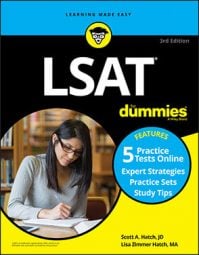The LSAT will expect you to understand arguments based on principles. Lawyers often base their arguments on particular principles or propositions. These propositions sound like statements of truths, especially universal truths — “we hold these truths to be self-evident” sort of statements. How well these principles apply or closely adhere to a particular situation is the matter up for debate.
How to identify principles questions
These logical reasoning questions test your ability to identify principles stated in arguments and then pick the answer that describes an action that conforms most closely to or violates most clearly that principle. Alternatively, a principle question may ask you to pick an answer that most accurately expresses a particular action’s underlying or supporting principle. These questions can look like this:
Which one of the following most closely conforms to the principle above?
Which one of the following judgments best illustrates the principle illustrated by the argument above?
Which one of the following judgments conforms most closely to the principle stated by Laila?
To which one of the following principles does the critic’s commentary most closely conform?
Which one of the following conforms most closely to the principle illustrated by the statements above?
Which one of the following most accurately expresses the principle underlying the argumentation above?
Which one of the following best illustrates the proposition above?
When you see the word principle, or occasionally proposition, read the argument looking for some fairly general statement about what’s necessary or proper given the circumstances. These arguments often start with the words “it is,” as in “it is crucial” or “it is essential.”
A principle is a kind of abstract rule or concept that applies to most situations. On the LSAT, laws themselves can be principles because they make statements about correct or incorrect action. When you see a principles question, try to come up with an abstract rule or unstated law that guides the passage’s author.
Read the argument looking for a principle. The argument may state it explicitly or just imply it. Definitely try to formulate an answer to principles questions before you look at the answer choices. Stating the principle in your own words usually isn’t that difficult, and it can save you tons of time spotting the right answer.
A principles example
Here’s an example of a principles question:
When deciding which colleges to include on her application list, Alicia researched university mission statements and found that College X, a small private college with a cost of attendance of $50,000 per year, was dedicated to producing compassionate and curious leaders. College Y, a large public university with a cost of attendance of $35,000 per year, promoted itself as a leading scientific research facility.
Alicia’s future goals include working as an executive of a nonprofit organization designed to provide assistance to underrepresented populations. Therefore, she decided to apply to College X rather than College Y.
Alicia’s decision most closely conforms to which one of the following principles?
(A)A direct relationship exists between a college’s cost and the quality of the education it provides.
(B)Students should apply to smaller colleges that offer more personalized attention from professors.
(C)A large research university cannot prepare students for a career as a nonprofit executive.
(D)Students should apply to colleges with mission statements that align with their goals.
(E)The best way for students to know which college is the best fit for them is by researching each college’s mission statement.
Break down Alicia’s decision process. Her main activity was researching mission statements. Although the paragraph provides each college’s cost and size, it doesn’t mention that Alicia used these factors in her comparison of the two colleges.
The statement leading to Alicia’s conclusion regards her plans to lead a nonprofit organization, so she most likely based her decision on a determinate of which college provides a better preparation for her goals and used the college’s mission statement to determine that. Therefore, the underlying principle guiding her decision is that she should put colleges on her application list based on how well their mission statements fit her goals.
Choice (A) regards college cost, but no evidence exists to indicate that Alicia considered price in her decision, so it can’t be the right answer.
Choice (B) can’t be the underlying principle. It concerns college size, and Alicia researched college mission statements rather than college sizes.
Choice (C) may seem applicable at first, but it actually regards what universities can and cannot do rather than what a student like Alicia should rely on during the college application process. So the principle in Choice (C) doesn’t specifically relate to Alicia’s decision-making process.
Choice (D) is the best answer. It specifically relates to Alicia’s decision regarding whether to apply to a particular college and supports her use of mission statements in the process.
Choice (E) seems very similar to Choice (D). It acknowledges the importance of college mission statements. However, the principle supports Alicia’s research activity rather than her decision to apply to a college based on her research. So Choice (D) is a better answer than Choice (E).
Choice (D) best expresses the principle upon which Alicia based her decision to add College X to her application list. It verifies that applying college mission statements to one’s goals is a good way to create a college list.

